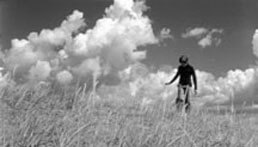Russian film pits sons against father, with God peering over their shoulders
To even the most casual art historian, the sharply foreshortened figure registers as a dead ringer for “The Lamentation Over the Dead Christ” painting by Andrea Mantenga, one of the most masterful and influential artists of the Italian Renaissance. The only discernible difference is the lack of stigmata on the actor’s hands and feet.
For it’s not Christ at all, but rather a too-human father fast asleep. Agape in the bedroom doorway are his two sons, Andrey and Ivan, setting eyes on their prodigal father who has returned after a mysterious 12-year absence.
This moment perfectly epitomizes “The Return”—at once narrative, spiritual, and most importantly, astonishingly poignant—a deceptively complex drama to be absorbed on any or all of these emotionally fertile levels.
First-time Russian director Andrey Zvyagintsev has been lauded worldwide for this minor miracle of a film. Among its many accolades: winner of The Golden Lion Best Film award at the Venice 2003 film festival and nominee for best foreign language film at the recent Golden Globes.
Initially, the story seems simple enough. A nameless father, who has emerged from nowhere, takes his boys away from the security of their mother on a fishing expedition that turns into a business trip of sorts. The business, we discover later, is the retrieval of a secret treasure buried long ago on a deserted island.
The father is also attending to the risky business of teaching his sons life lessons they missed out on while he was long gone. Short on patience, the despot of a dad barks orders, devises tests of will, and relentlessly denigrates his baffled sons.
Their so-called fishing holiday turns out to be a harrowing odyssey for all. Andrey (Vladimir Garin), an angelic, pimply-faced teen, is eager to win his father’s approval, despite being forced to dig out their car in a deluge of near-fatal proportions. Even being slapped for insubordination fails to curb the boy’s resolve.
Younger brother Ivan (Ivan Dobronravov), who hasn’t quite outgrown his “Vanya” nickname, gets booted out of the car for acting up. Left alone to soak in the storm, Ivan’s anger hardens into hatred—he even doubts the man is his father at all. When the father demands to be called “Papa,” Ivan spits it out with no small degree of vitriol.
A close-up of fishes out of water, gasping for life, suggests how the boys must feel in their new surroundings. When Ivan happens across a dead gull during their hike on the island, it’s a telltale sign that tragedy is on the horizon.
Relative newcomers Garin and Dobronravov deliver exceptionally mature performances that capture the nuances of bickering brothers caught between filial love and pride. The father, played perhaps a tad too sullenly by Konstantin Lavronenko, with his magnetically devilish salt-and-pepper good looks, is so inscrutable his moodiness bedevils his young sons.
With its Christ-like imagery, journeys to truth, and conflicts of faith “The Return” echoes biblical themes but, thankfully, never becomes true allegory. In interviews, Zvyagintsev refuses to discuss any religious aspects in the film, for fear he might bias viewers.
“One shouldn’t speak out loud about sacral and important meanings,” he said, “because as soon as we start blabbering about them, all that is magic immediately evaporates.”
Up to a point, Zvyagintsev is right—the uncanny, intricate pull of the film lies in its unspoken, viscerally poetic power.
And yet, at the risk of spoiling the magic, there’s no denying the obvious biblical connections, intended or not. Aside from the religious themes and iconography, the film is segmented into seven days, an obvious Genesis allusion, and even has a kind of “Good Friday.” Curiously, the director claims that filming took 40 days (and, presumably, 40 nights).
Zvyagintsev, who grew up in Siberia, reveals that the film’s title has a secondary meaning beyond the father’s return. The film marks a return to a purer, more potent Russian film tradition that proliferated before 1917’s October Revolution that brought Bolshevik rule and transformed into propaganda.
“The Return” breaks free from such social didacticism. This renewed––dare I say, “resurrected?”––aesthetic is about, as Zvyagintsev puts it, “overcoming the domination of the material world.”
True to its Old World Russian roots, emphasis is placed on the metaphysical. When the fishing party leaves civilization, the father and sons penetrate a primordial landscape where a crepuscular beauty, embodied in nature, rules. The divinely archetypal elements—fire, earth, wind, rain—take precedence over all else.
Sound is amplified, not literally, but by lowering the volume of the extraneous––oars stirring the water, raindrops pattering on their tents, tiny waves lapping on the shore, wind rustling through the weeds. We become acutely aware of these wonders, like a blind person whose hearing becomes finely attuned.
Thanks to the splendidly sensuous cinematography by Mikhail Krichman, the film’s sights are as mesmerizing as the sounds.
Zvyagintsev credits the illustrious Russian director Tarkovsky, as well as cinematic greats Antonioni and Orson Welles, as seminal influences in his work. Budgeted at a mere $405,000, the otherworldly film packs more emotional wallop than a Hollywood mega-drama, although to be fair, for many viewers its pace might be ponderous and conclusion far from satisfying.
As with many staggeringly profound works of art, “The Return” comes complete with its own real-life tragic back-story. Several months after filming, when assembling the cast and crew for an initial screening, Zvyagintsev learned that young Vladimir Garin, who was semi-autistic, had gone alone to a lake near his home, dove from an inflatable boat and drowned.
Perhaps all that beauty was simply too much to bear.


































